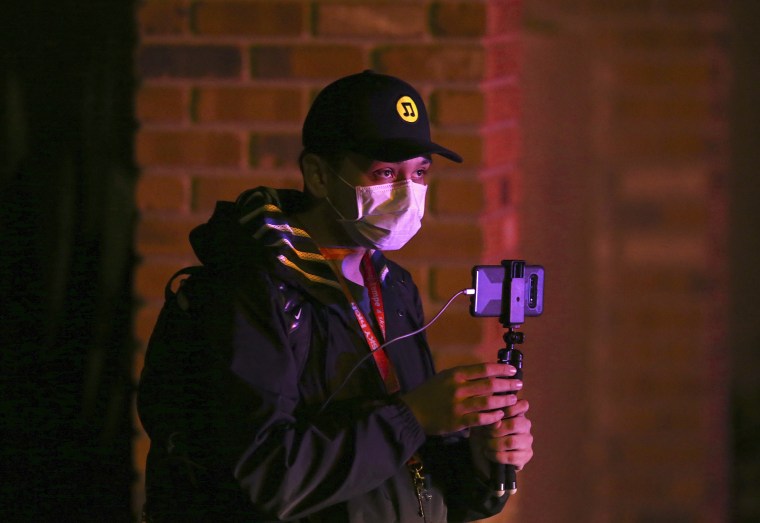The ACLU and several news organizations have filed a lawsuit over a controversial Arizona law signed last month that bars recording video of law enforcement within 8 feet.
The law, sponsored by state Rep. John Kavanagh and signed by Gov. Doug Ducey, both Republicans, makes it a crime to record law enforcement activity within that distance and violators can face a misdemeanor charge after they are warned once to back up.
The new lawsuit, filed Tuesday, seeks an injunction ahead of the law's September effect date.
The suit claims the law violates the First Amendment right to record, will inhibit journalist ability to work on police stories, and will create a new risk of arrest and prosecution for Constitution-protected activity.
The ACLU of Arizona said the law will create “irreparable community harm,” if allowed to go forth.
The complaint was filed in the U.S. District Court of Arizona by the ACLU of Arizona and 10 news media groups. Those groups include the Arizona Broadcasters Association, Arizona Newspapers Association, local news stations, as well as media broadcast companies, including NBC Universal Media, NBC News' parent company, on behalf of its subsidiary Telemundo Arizona.
It names Arizona Attorney General Mark Brnovich, Maricopa County Attorney Rachel Mitchell, and Maricopa County Sheriff Paul Penzone as defendants.
Filming officers has become a tool in police accountability and preventing misconduct. The high-profile death of George Floyd in May 2020 in Minneapolis, Minnesota, sparked national outrage and protests after bystanders took cellphone video of officers holding him down as he pleaded that he couldn't breathe and died.
The Arizona law states: “It is unlawful for a person to knowingly make a video recording of law enforcement activity if the person making the video recording is within eight feet of where the person knows or reasonably should know that law enforcement activity is occurring."
However, it has exceptions for police activity on private property and for passengers in a vehicle during traffic stops. Subjects of police activity can also record law enforcement interactions as long as they’re not being handcuffed, searched or subjected to a field sobriety test.
The plaintiffs argue the law “infringes the clearly established First Amendment rights” to record the public activities of law enforcement officers. By allowing “police officers to arrest and punish people for simply recording video of their actions,” it “creates an unprecedented and facially unconstitutional content-based restriction on speech about an important governmental function,” the complaint said.
News organizations are part of the lawsuit to prevent the law from “trampling on their rights to report news, document the activities of public servants and hold police accountable for their actions toward the people they are sworn to protect and serve," the complaint said.
It noted that journalists frequently directly cover law enforcement activities as well as stories where officers happen to be present such as protests, festivals and sporting events.
The ACLU argued it films officers on the job when they interact with or use force against protesters — and such recordings are vital to accurately record the encounters and deter police misconduct, the complaint said.
The lawsuit claims compliance will also be difficult, especially in crowded public situations like protests and parades, when it'll be difficult to avoid filming officers.
Brittni Thomason, spokesperson for the Arizona Attorney General’s Office, defended Brnovich as having "always been a champion of upholding our constitutional rights, and he will continue to do so.”
“This litigation raises some important issues that our team is now reviewing,” Thomason said Wednesday in a statement to NBC News.
A spokesperson for the Maricopa County Sheriff's Office shared a statement from Sheriff Penzone saying: "To include me in a lawsuit for which I had no involvement in crafting, vetting or passing is an example of targeting a law enforcement leader for the sake of sensationalization."
"There are 15 Sheriff’s and 50-100 police chiefs in Arizona. The ACLU listed my name only as a tactic to harass and target me," he continued. "I find it disingenuous and irresponsible."
Mitchell and the Maricopa County Attorney's Office did not immediately respond to a request for comment.
The legislation was controversial even in its bill form. Kavanagh said in a March op-ed that he introduced the bill for safety reasons and he didn’t believe it would affect the integrity of recordings taken of police.
In March, 27 organizations, including the Press Freedom Defense Fund, sent a letter to the heads of the Arizona Senate Judiciary Committee in opposition to the bill, arguing it violated free speech and violated the “clearly established right” to photograph and record officers performing their official duties in public.
